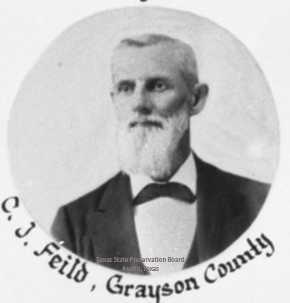Dr. Julian Clarence Feild
1841-1906


The Biographical Souvenir of the State of Texas (1889), writing of Dr. Julian Clarence
Feild Sr. (1841-1906), said, "The Feilds are of
Scotch descent, three brothers - Theophilus, Charles and Alexander - having come to this country from [Scotland] at an early
day."
Genealogical records, however, indicate that the Feilds arrived in Virginia in the 1600s from England. At least one of the many Feilds owned
plantations with numerous slaves in Mecklenburg County, Virginia; some were respected physicians.
Julian's father, William H. Feild (1796-1861), was born in Mecklenburg County and moved to Giles County, Tennessee, when a young man.
There he married Mary A. Flournoy, a native of Buckingham County, Virginia. After serving in the Tennessee Senate, William in 1842
moved his family to Little Rock, Arkansas, where he was soon elected to the office of circuit judge, with a district that comprised about
one-half of the state of Arkansas. He held that office for more than twenty years, dying in 1861.
The eighth of nine children, Julian Clarence Feild was born in Pulaski, Giles County, Tennessee, and by age nine was in Little Rock.
He was educated in the common schools and at St. John's College there. In 1858 or 1859, Julian began to study medicine under Dr. C. Peyton, M.D.
, of Little Rock. Subsequently he attended lectures in Philadelphia and New Orleans. He received the M.D. degree in 1861 from the Medical
Department of the University of Louisiana (now called Tulane).
A short time after Julian left college, the Civil War broke out. He enlisted on the Confederate side and for three years served as assistant
surgeon, being commissioned an officer in Company S, Confederate States Medical Staff Infantry Regiment. He was then promoted to be surgeon and in
this capacity served until the close of the war. He served under Gen. Samuel Bell Maxey (1825-1895), and during the greater part of the
time was located in Indian Territory. Assigned as "medical purveyor," Julian was in charge of the district's medical stores. Maxey was
replaced as commander of Indian Territory in February 1865 and given an infantry division near Houston.
At the end of the Civil War, Dr. Field located at Fort Smith, Arkansas, where for eight years he practiced medicine. In 1872, he
came to Texas and opened an office at Denison. By early 1873, he had determined to make his home there and enthusiastically joined in the
creation of institutions important for the young town.
|
| |
|